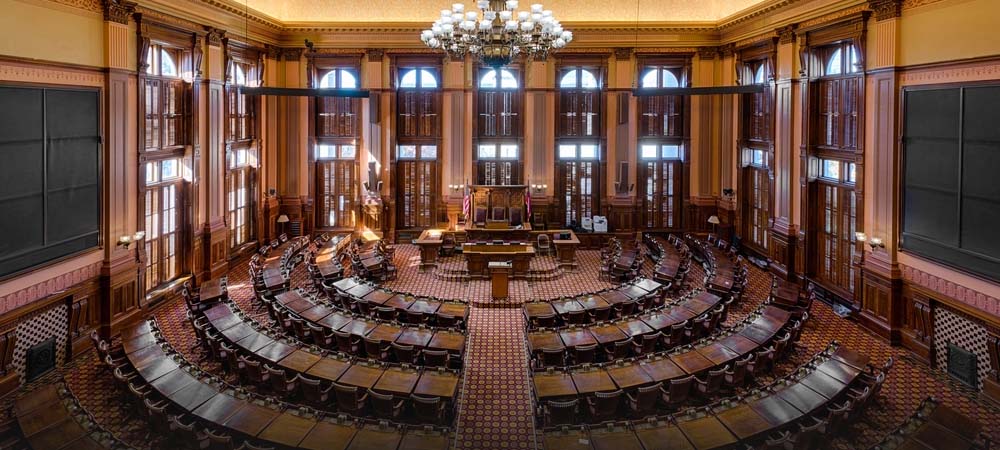- Sports betting bills are gaining traction in Georgia, Minnesota, Missouri, Kentucky, and even Texas.
- New York and Massachusetts are each deliberating restrictions on advertisements and affiliate marketing, respectively.
WASHINGTON – This week in sports betting saw a myriad of important developments, mainly in terms of pushes to legalize. States such as Missouri, Georgia, Kentucky, Minnesota, and Texas have all made some progress in their own way.
Massachusetts and New York on the other hand are looking at ways to regulate or restrict their already existing sports betting markets, mainly through targeting affiliate marketing or advertisements. Legal betting sites are teeming with excitement at the prospect of multiple states lining up to be part of sports betting history.
Legislative Developments Overview
Starting off with Missouri, strides are being made in both the House and Senate with legislation backed by their professional sports teams. Importantly, the bill made it past Senator Denny Hoskins, who was the main roadblock in 2022’s sports betting legalization push and filibustered the now-passed bill earlier this week.
VLTs remains a contentious issue that may stop this year’s push if Hoskins once again refuses to allow sports betting-only legislation through.
In Minnesota, waves are being made through the House after hearings happened on Monday afternoon. The prospective legislation utilizes 11 Minnesota tribal nations partnered with an operator to create a full-fledged sports betting platform.
Licensed horse racing currently is not included in the House Bill but does appear in the Senate bill that hearings have yet to occur for. Minnesota sports teams support the legislation despite not being directly involved with the creation of the industry. The Senate bill bears much resemblance but importantly allows for tribes, professional teams, and licensed horse racing tracks to all offer in-person sports betting at their respective facilities.
Kentucky has made good progress on horse track racing, but still needs more support for broader sports betting. A new bipartisan bill has been introduced and notably omits online poker and daily fantasy sports in an attempt to gain the needed support.
The bill would legalize in-person sports betting for nine tracks with the potential for up to 27 total operators. Sports betting at large will likely have to wait until next year though, due to this legislative session requiring 23 votes to pass the bill as opposed to the 20 it would need next year.
Polls found that 60% of Kentuckians support legalization, making it only a matter of time.
Georgia is gearing up for their biggest sports betting push yet, introducing two new bills that brings the total up to four, with a couple receiving strong support like SB57.
SB57 was passed through the Senate Economic Development and Tourism Committee on February 20 and will look to continue the momentum. The bill regulates both retail and online sports betting in Georgia, including horse racing, and is set up to distribute 18 total betting licenses.
The bill is estimated to create 8,500 jobs and would total around $1 billion in economic activity annually.
Texas is currently in the process of passing sports betting legislation in both the House and Senate, and have importantly received support from Governor Greg Abbott, who stated that he will not stand in the way of sports betting.
However, Abbott did caveat this by saying that he would be wary of any bill that legalized “casino-style” gaming as well as those that would place gaming terminals like VLTs in airports or gas stations.
Senator Lois Kolkhorst’s support for the bills represents an important development in the potential passing of them due to her strong ties with Lt. Gov. Dan Patrick, who has largely held up sports legalization in the state. All of this bodes very well for Texas’s chances to legalize later this year.
Potential Regulation and Restrictions
While many states have made significant moves to legalize sports betting, New York and Massachusetts are looking to impose some restrictions, mainly to protect younger audiences and tweaking rules for affiliate marketing, respectively.
For New York, the state’s gaming commission is preparing to review the rules regarding promotional content and advertisements with the goal of limiting exposure to those younger than 21.
The new rules will disallow the usage of cartoons, entertainers, and music that is geared towards younger audiences in ads for sportsbooks. In addition, a full-on ban of advertising on college campuses and their sports grounds has also been proposed.
The final portion of this regulation would prohibit sports betting companies from using words like ‘free”, “risk-free”, “cost free”, etc. to describe promotions. More so, the rules would require greater transparency from legal sportsbooks as to how many dollars need to be wagered to qualify for free bets and/or bonuses, with rules having to be the same size and font as the offer.
Massachusetts is also aiming to create restrictions, mainly aimed at affiliate marketing.
One proposal would ban sportsbooks from partnering with companies that advertise for them, a significant cause for concern with the online sports betting launch happening on March 10, less than two weeks from now.
Some proponents have ceded that cost-per-action partnering may be amended while revenue sharing deals will be struck down, but no official course of action has been specified. It will overall be a tight time to implement such changes, with a final decision needing to come in the next week and a half prior to the online sports betting launch.
Advertising Disclosure
In order to provide you with the best independent sports betting news and content LegalSportsBetting.com may receive a commission from partners when you make a purchase through a link on our site.
News tags: Dan Patrick | Denny Hoskins | Georgia | Greg Abbott | Kentucky | Lois Kolkhorst | Massachusetts | Minnesota | Missouri | New York | Texas

Jeremias is a current Florida State University student majoring in Editing, Writing and Media as well as Media/Communication studies. Primarily focused on the NFL, NBA, and NHL, Jeremias has a passion for sports statistics research that helps bettors find the blind spots in sportsbooks.


 Bitcoin Sports Betting Sites
Bitcoin Sports Betting Sites Best Online Sports Betting
Best Online Sports Betting Famous Sports Bettors
Famous Sports Bettors States With Legal Sports Betting
States With Legal Sports Betting Sports Betting Events
Sports Betting Events




